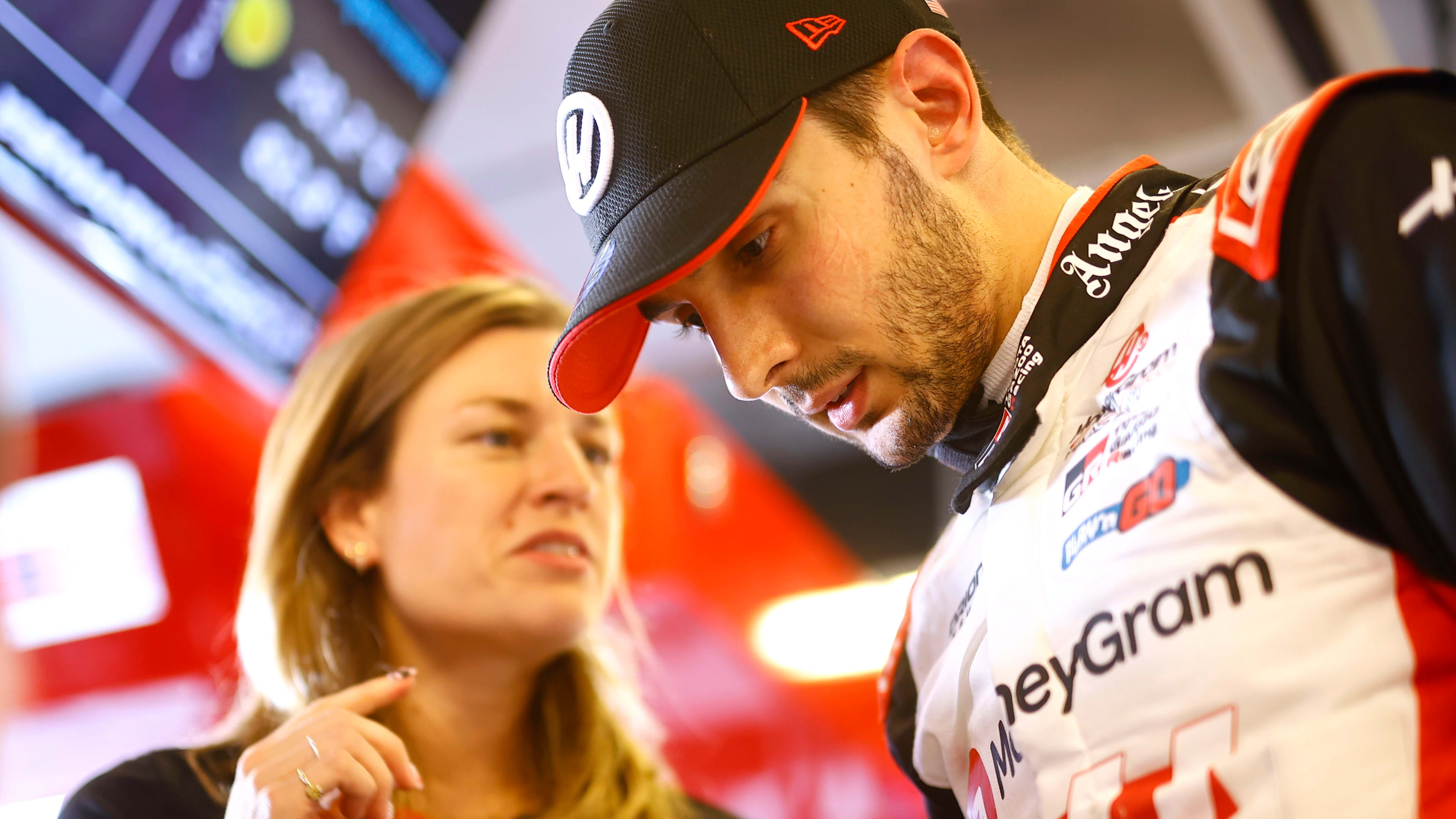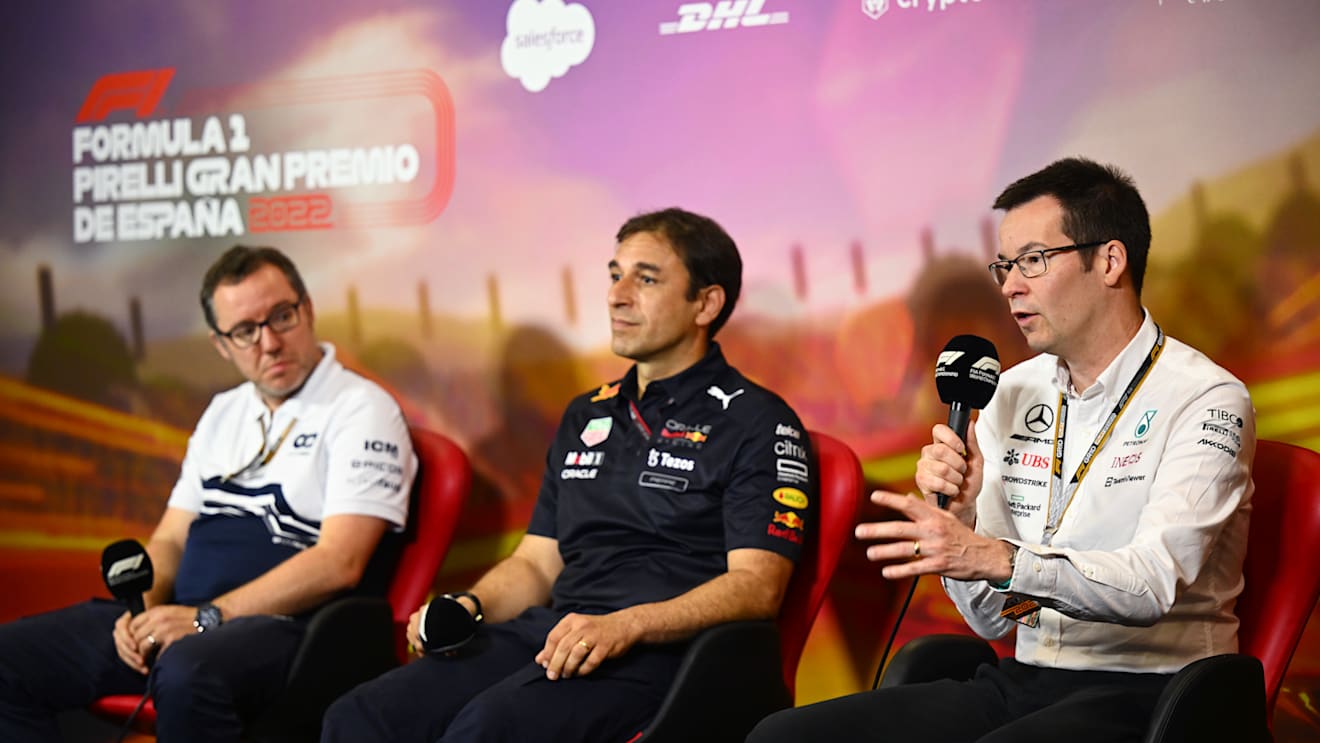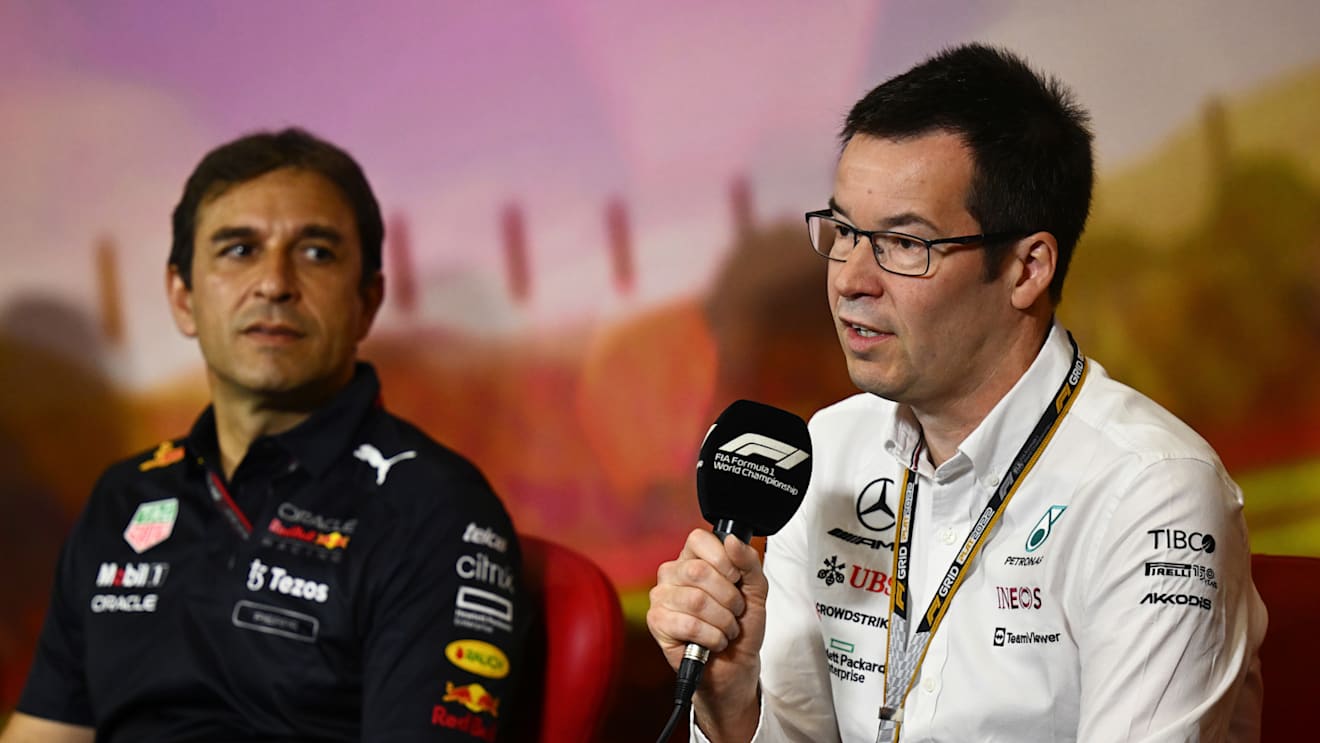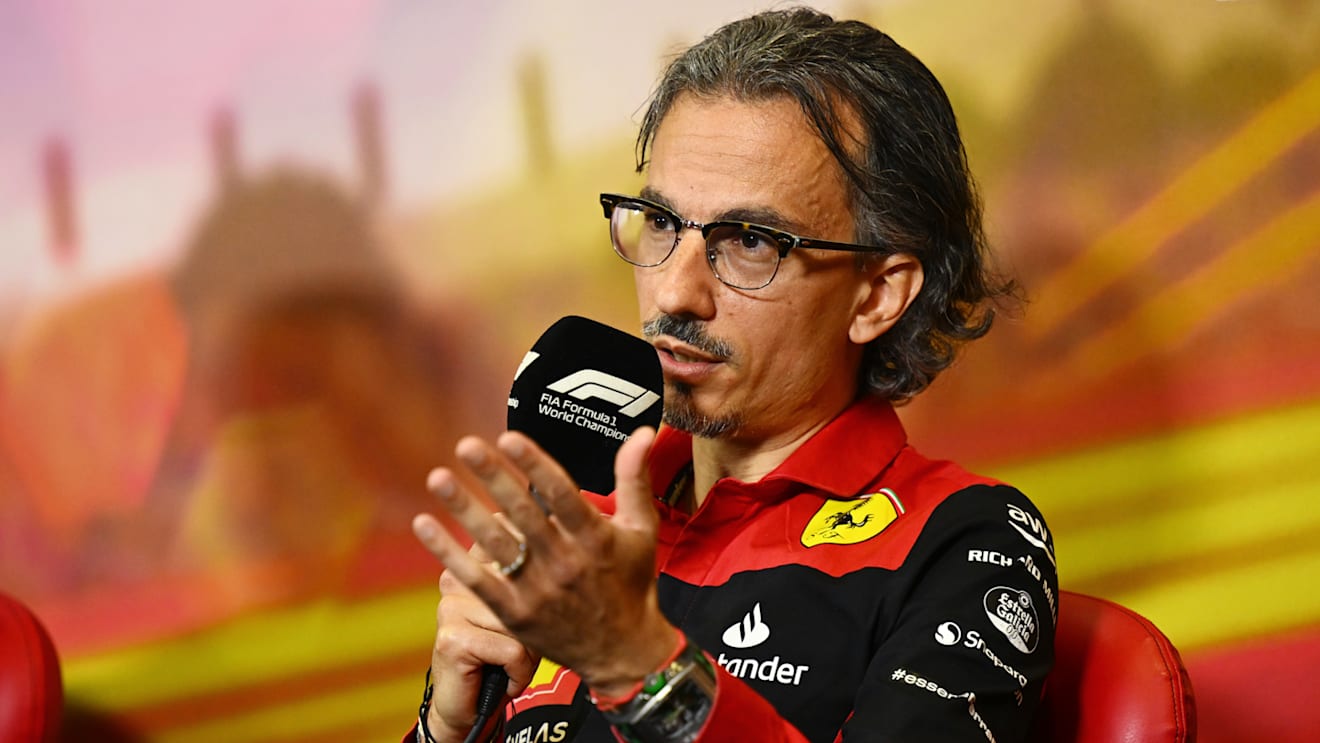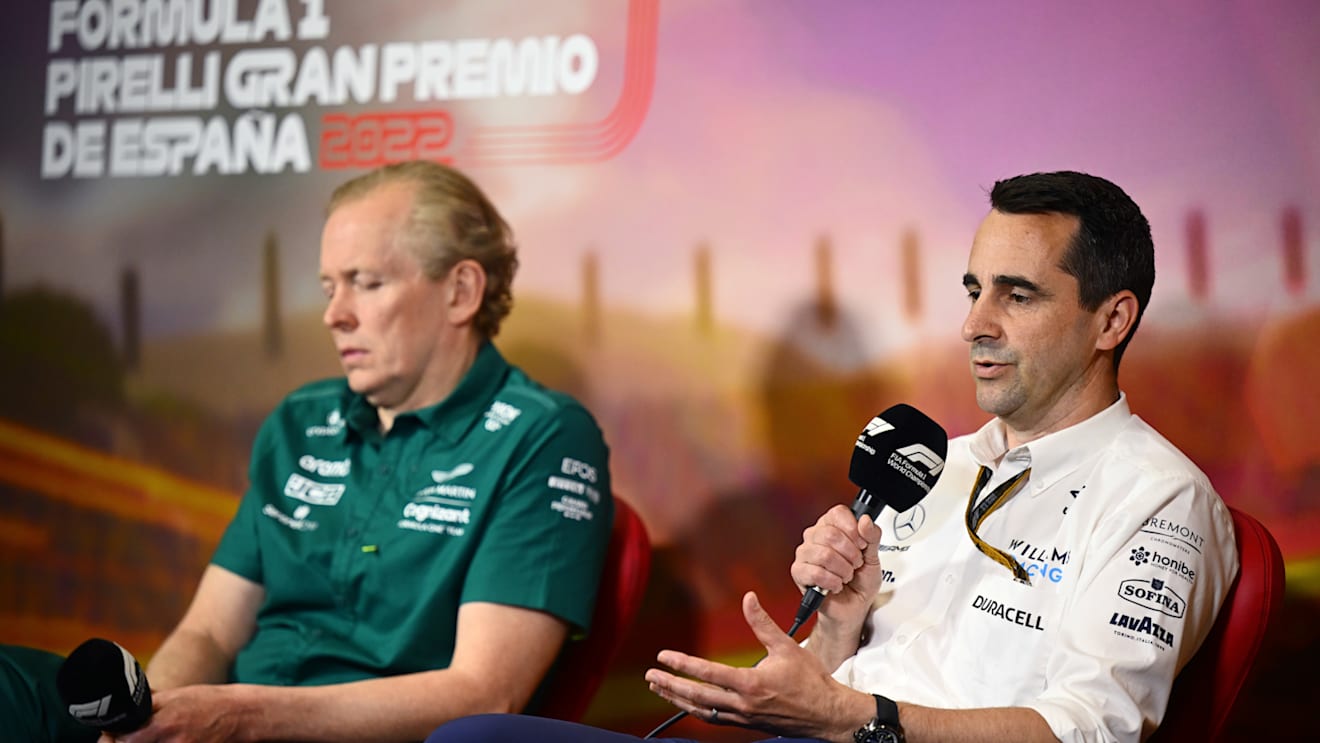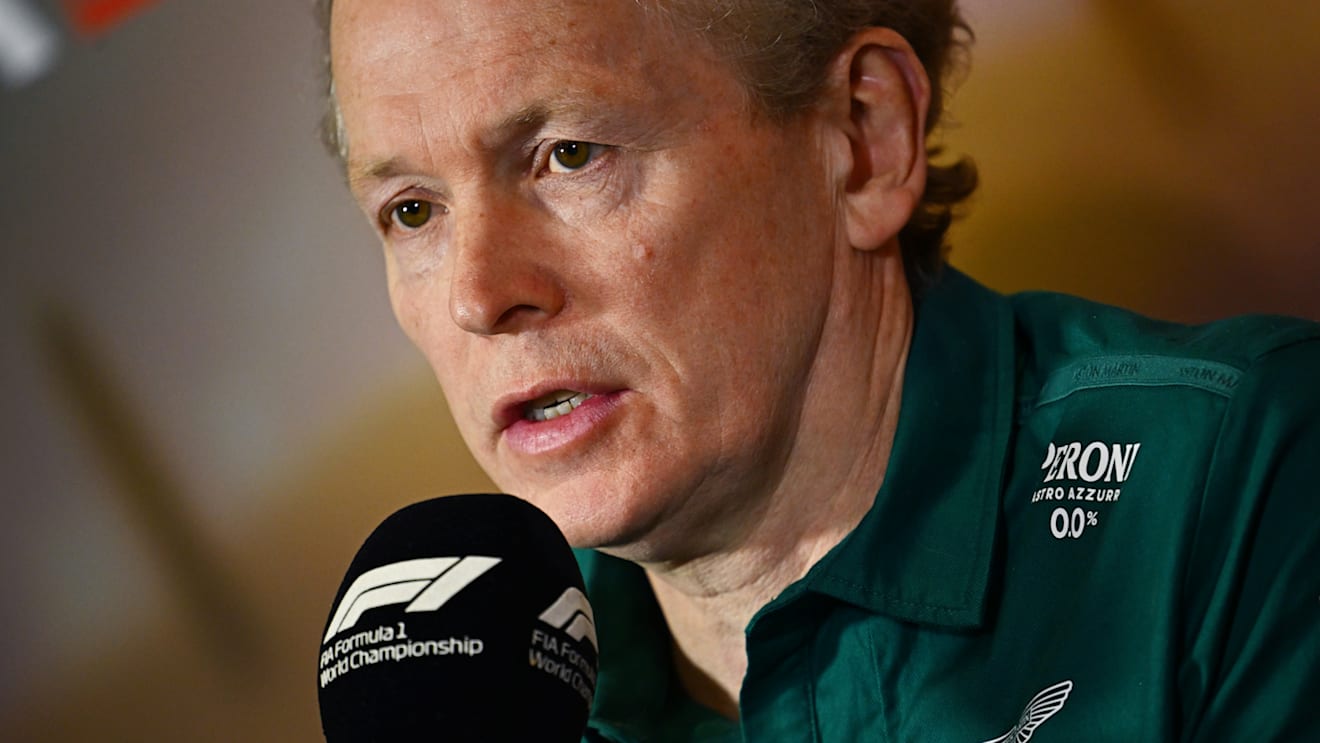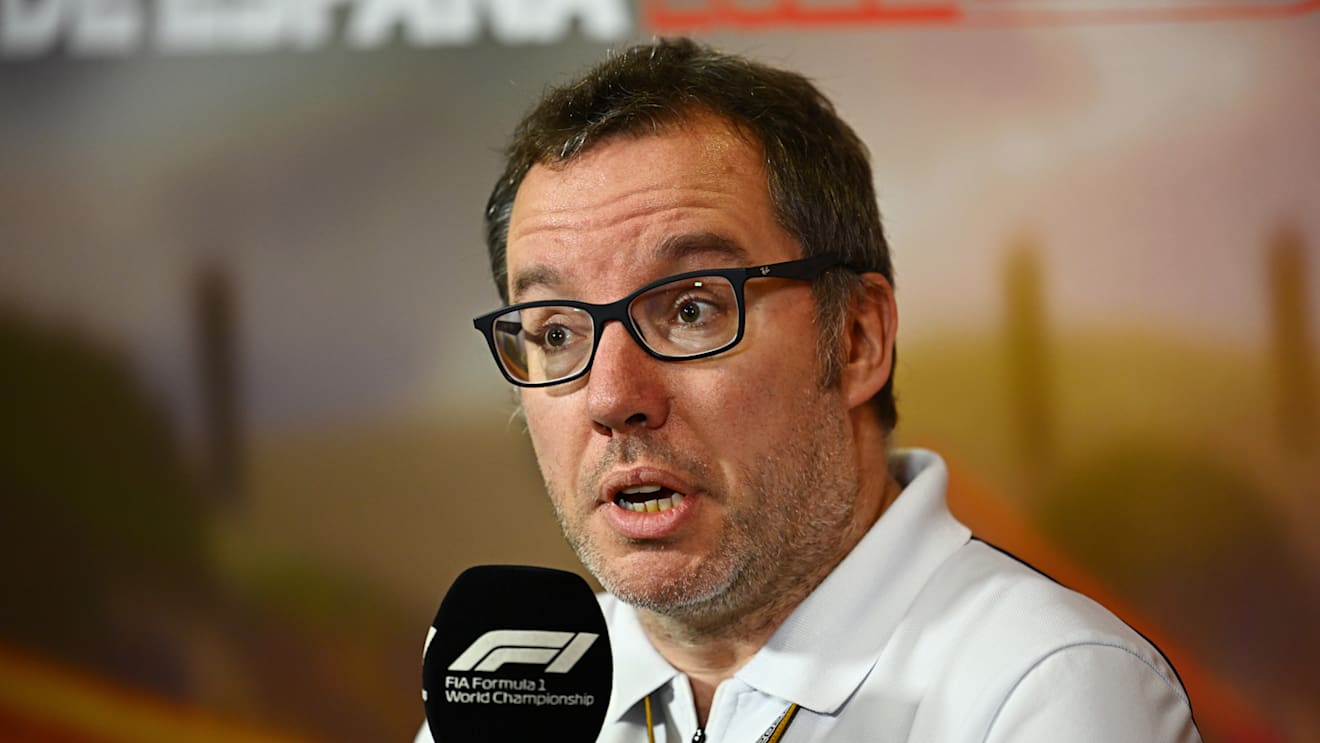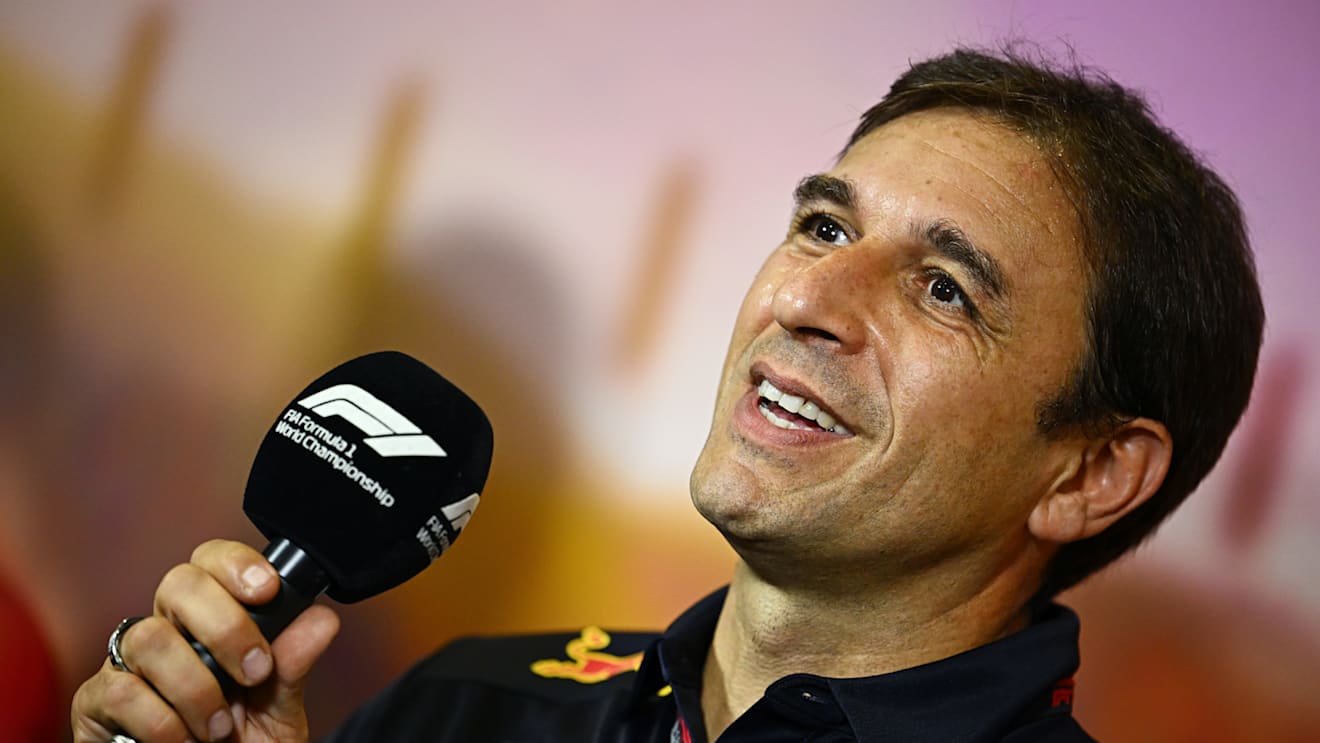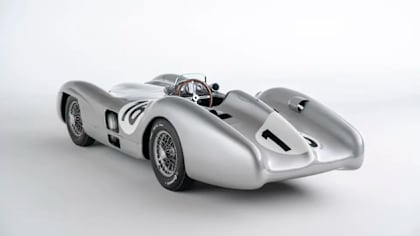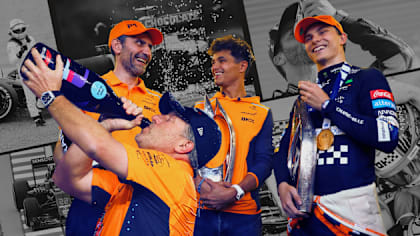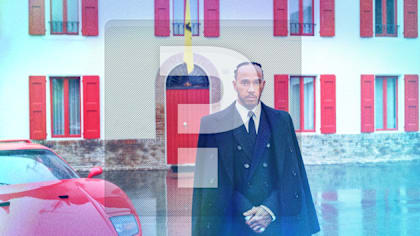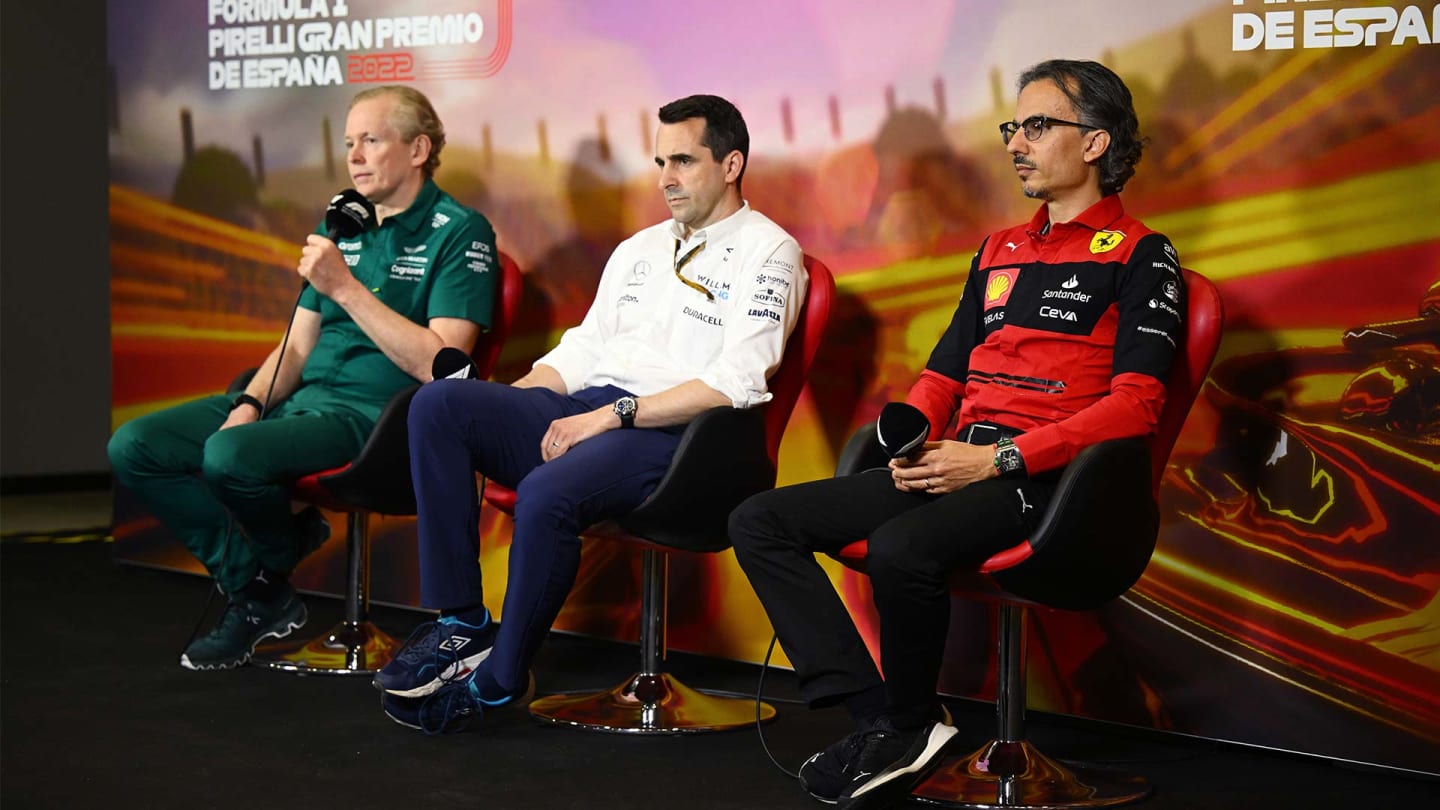
News
FIA Team Principals press conference - Spain
Share

PART ONE - TEAM REPRESENTATIVES
Andrew GREEN (Aston Martin), Dave ROBSON (Williams), Laurent MEKIES (Ferrari)
Q: Andrew, we’ll start with you. Aston Martin has brought a significant upgrade to this race, so how are the new parts performing?
Andrew GREEN: Yes, we have. I think it’s very early days for the new package. We’ve only done a couple of hours of testing, so we’ve still got an awful lot to learn.
Q: What were the main weaknesses of the old spec car and have the upgrades addressed those in the two hours that you've had so far?
AG: Well, the weaknesses of the launch car were quite apparent, even before we'd launched it. And then, after launching it, and running, the issues were compounded by additional problems that we encountered on track, that we effectively… we tried as much as we could in the time we had to try and resolve them but it was very much a dead end. I think our set-up options for the launch car were very, very limited. So, we're hoping that this change will allow us some greater set-up freedom.
Q: But what are the drivers been saying about the new spec?
AG: It's different! They still don't know; they're still learning. We still don't know what the what the potential of the current car is. But all we know is that it now gives us it gives a set-up options that we've never had before.
Q: And in terms of the cost cap, can you just give us some insight into how difficult it is to manage the developments of an upgrade this year.
AG: It needs to be incredibly well managed, to the point where… this car was conceived in 2021 before… right back to chassis design, when we… because of the new set of regulations, we weren't – unlike a few teams – we weren't 100 per cent sure which is the correct route to take. So, we gave ourselves plenty of options on the chassis. We planned very early on to have a significant change if we needed it around Race Six. So, when we launched, with the launch car, we limited the quantities, and made sure the design was adaptable at that time to allow us the freedom to do something like this. Because if we hadn't planned for it early on, I don't think we'd have be able to do it under the cost cap. Or if we had, this would be the very last change we’d ever be able to make to the car. So, it does need to be incredibly, incredibly well managed. And it gets harder and harder as the season goes on.
Q: And Andrew, speaking personally, does it feel like you've been working under a cost cap for most of your career? So in terms of how you're managing your team, it's actually no different to how it was back in the Jordan days. The Force India era…?
AG: Yeah, there is a the old Force India/Jordan mentality still there. But we did have a couple of years where – shall I say – the genie was let out. And so trying to pull that back in the bottle is quite difficult. But then the mentality is still within the team. We still know how to work through it really, to be efficient with what we do and how we spend. So it's not something we're unfamiliar with. It's just something we've got to get used to again.
Q: Dave, let's come to you next. Can we start by throwing it back to FP1 yesterday, and the performance of Nyck de Vries. What was his programme? And how did he get on?
Dave ROBSON: He got on extremely well. His programme was the engineering programme that Alex would have done had he been in the car. He executed it really well. The way we set the tests up, his car was the baseline for the new components that were on Nicholas Latifi’s car. He did exactly what we what we needed him to do.
Q: Any plans to run him again this year?
DR: No, not at the moment. So that was that was his opportunity in FP1. One of the two P1 sessions we have to give up by regulation to a young driver. That was his one go.
Q: So Dave, tell us a little bit more about the FW44. What are the biggest challenges with your car in terms of extracting lap-time?
DR: That's a good question. I mean, it's a little bit variable depending on which track we’re at – but certainly it has it has a few through-corner balanced characteristics that we'd rather it didn't have. But partly what we've been doing during the season is trying to understand how much of that is down to choices we've made, and we could genuinely have made different choices – and therefore there is scope to improve it reasonably easily, and how much of that is a feature of the regulation set. When we get such a big change in regulations, you've got to very quickly work out what is undesirable but almost unavoidable, and what we simply could have done better. So, we've been working on that, we've got a pretty good idea, I think, now of what we need to do, what the regulations allow us to do, and we’re now finalising how to do it, or how best to do it most efficiently.
Q: Let's talk about your race drivers. Why has Nicky Latifi struggled more with the car than Alex?
DR: Another good question I think he has struggled to get to grips with it a little bit more than Alex, I suppose. Alex came in quite fresh, not knowing what to expect, necessarily from either Williams or the new regulations set. And his mindset was just to jump in and get on with it and deal with it. Nicolas tends to think about things much more and, as soon as things aren't quite as he wants them, then he does struggle a little bit more. And so we're still coming to terms with exactly how we set the car up around the tyres at any particular circuit, to allow him to drive the car as he wants. So, I think there's it's just not quite clicking for him yet. And obviously, we're working very hard with him to work out exactly how we get the best out of it.
Q: What's impressed you the most about Alex Albon?
DR: Yeah, lots of things about Alex. I think his whole attitude is outstanding. He's happy just to jump in the car, and make the most of what he's got. And I think, probably best of all, his whole attitude to the races has been has been outstanding. We've not had brilliant qualifying sessions recently but on Sunday, he just strikes that balance between being aggressive in attack, and defence. He just gets on with it, knows how to manage the tyres and just puts together a really good race, which allows us a little bit of flexibility on the strategy. We know that he'll respond to it, deal with it and get the best out of the car. So, I think probably that's the thing that's impressed me most is this whole approach to Sunday.
Q: Is it fair to make a comparison to George Russell?
DR: I suppose that's natural. Not just because of their time in the Williams, but their whole history, I think goes back quite a long way. I'm not sure it is necessarily fair or helpful to make comparisons. I think they're different. But the results at the moment, I think, are probably just as good, or at least as good with Alex. He's got a huge amount of talent. Not just to drive the car, but I say to bring the whole team together and make sure we get the most out of everything every Sunday. So, I think he's got a he's got a very bright future, I think.
Q: Laurent, we've heard about the new parts on the Aston Martin. More bits on the Ferrari this weekend. How are they performing?
Laurent MEKIES: Well, you know, Tom, it's early days for us as well. Yesterday has been about exploring, we have been hoping for this first package for a few races now. So we are taking our time to explore it. We are taking our time to make sure we are able to set up the car correctly around it. So, that's a little bit where we were focused yesterday. The first indications are positive in a way that we will be will be racing this weekend with both cars. And you will see, again in FP3, still some explorations, both in terms of how we set up the car and in terms of adapting our programme to make sure we understand the package correctly.
Q: Ferrari had a front row lockout at the last race. So what areas of performance have you been trying to address with these new parts? Doesn't look like you're lacking in that many areas.
LM: Well, you know, on one side as being the first package of the season, it will be lying not to say that we are looking at an overall level of performance, no? So it's not a particular element of the car in a way that I think you guys have been describing our cars quite often as being ‘good all around’. There was not a given weakness that we were targeting with a new package, we knew that it, coming after five races, it had to give us some core lap-time. That was the first target of the package. Then the other aspect is, is the biggest topic on the on the technical side of the season: porpoising. We were also targeting to get some improvement with that package. So that's also what we have been exploring yesterday. So I will say that it’s about those two aspects for us.
Q: Can we get a word on Carlos? He scored – what is it – half the points of Charles in the opening five races? Just tell us how has the team helped him get more comfortable in the car? And have you been surprised that he's struggled – seems a harsh word – but he struggled as much as he has relative to his teammate?
LM: Well, you know, at first, he’s still had a decent number of podiums, three podiums in five races. I will not call it a struggle. It is fair to say you are right that the car is born with characteristic that suit him a little bit less. It is it is clear in his comments, it is clear in his feedback, it is clear in what we see in the data. So, we are working with him to try to tweak the car and to develop the car in a way that it can give him the confidence he needs in some phase of the corner. So, we think really much it's within those two aspects: giving him the time to get around the car characteristic, and on our site to try to develop it and pull it towards what he feels comfortable with.
Q: Now, given the points gap between your guys – it's more than 50 after five races – and the closeness of this World Championship fight with Red Bull and potentially others. Are we close to the point where some difficult decisions need to be made on the Ferrari pit-wall with regard to favouring one driver ahead of another?
LM: No, I think it's very early days for that. I think if you had a look at last year, points difference at the beginning of the season, you could have said the same thing. And in the end, things change. We are pushing a lot to make sure Carlos can adapt, Carlos can get more comfortable. He has shown extremely strong performance last year, we are convinced that he is going to develop stronger performance in the very short term. So, there is… it's Race Six of 22 races, we are very, very far from having the good problem you are talking about. It is a topic for much later.
QUESTIONS FROM THE FLOOR
Q: (Christian Menath – motorsport-magazin.com) Question is for Andrew. There has been quite some discussions yesterday about your car and it's no secret that Aston Martin is growing massively at the moment, a few engineers came from Red Bull. Red Bull said they have been downloaded some data from their servers afterwards, after they left. Can you explain how big the contribution of these engineers that came from Red Bull was to your new package you have on the car this weekend?
AG: Yeah, I don't know what these accusations are that Red Bull are flinging about. All I can say is that at no stage did we ever receive any data from any team, from anyone. The FIA came in and did a thorough investigation, examined all the data leading up, in the history of this car, they interviewed all the people involved and concluded that it was completely independent development. And to that point, where you're talking about potential in employees, this car was conceived in the middle of last year, as a dual route with the launch car and the majority of the releases were made before anybody from Red Bull even turned up. So I think the accusations are very wide at the mark.
Q: (Dieter Rencken – Racing News 365) Question to all three about the budget cap, what the impact will be of the budget cap particularly on the upgrade programmes that you had planned and whether these will continue, but more in particular, Andrew if you could just also elaborate on whether the complete change in car philosophy and direction means that you won't have any more upgrades in future, or whether you very much restricted?
AG: Okay, I’ll answer that one first. Now, like I said at the top of the interview, we planned for this from a very early stage, to be able to do this this type of dual approach, and it does lead to a lot of management. Do we have money left in the pot to carry on developing? Yes, we do. And we will develop this car throughout the remainder of the season, but it is a big challenge. It is a very big challenge, and one that really does have to be managed really quite carefully.
DR: Yeah, I think I agree entirely with Andrew. It is a difficult challenge, the cost cap is a constraint that is real. And it does affect what you can do. But it's just part of the new challenge. And it's the same for all of us, typically. But I think what you have to be is just ruthlessly efficient. You have to be very confident, as confident as you can be from the wind tunnel, or CFD, whatever the source of the upgrade is, that when you actually commit to making it, and bringing it to the car that you a) you're very confident that it will work – and maybe we do a little bit more, spend a little bit more time doing that R&D than we would have done in the past. And you also have to be confident that it will not only work now, but you can see some future for it in terms of how you develop the rest of the car. What you can't afford to be doing is chopping and changing bits. It's all got to work coherently. And not just in the here and now but there has to be some vision of what that will look like going forward. So yeah, it's a challenge. But it's the same for all of us. So it's just a new part of game, and we just have to be a little bit better than everybody else.
LR: Well, you know, I think it is a new aspect. And if you think back to how long for we have been playing with Technical Regulations and Sporting Regulations to make them rock solid as a sport? You have to admit the Financial Regulations are still a very young set of regulations, and how do we collectively make them enforceable? How do we make them equitable in all situations? It’s a big challenge right now. We know is going to take time. And therefore the key questions, we think, is how do you deal, how do we deal collectively with these early years of the regulations, where we know there is grey area, where we know there is things that needs to be improved? One simple example is how do we now deal with the sort of force majeure type of situations with inflation for example, that we've been discussing for a long time. So we feel the FIA should have the power to make sure that the rules are fairly applicable, and have the freedom in that case to make sure that the system doesn't explode because of early days difficulties. And we certainly think that in the long run, these will be a very good regulations for everybody. In the first early years, we need to be very careful to make sure we reach, as early as possible, the right level of enforcement and the right level of definition. I think in the meantime, we need to have to have some flexibility from all parties to avoid allowing things to collapse.
Q: (Adam Cooper – motorsport.com) For all of you, another question on a financial race. Can you talk through a bit about how the day-to-day FIA monitoring works? Because we haven't really heard much about that. How much extra workload is there for you? And could that monitoring be even stricter as Laurent suggested? Are there grey areas out there that teams can potentially take advantage of?
LR: Well, you know, it's a very good point. There is some extra work from the teams to do it. But that's fine, there is no way you are going to enforce this type of regulations, if you don't do it, until the last per centage, because even if there is small discrepancies out of the $140million that weren't certified, even if you have a one-two-three-four million discrepancies, it could mean one, two or three updates. So you need to nail it, up until the very last details of the company structures and country differences etcetera. And it's a level where we are not at currently. Simply because the regulations are young. And this is why, in that early phase, we all need to be very careful to have the necessary flexibility, to make sure we still have a fair regulations, we still have a fair playing field for everybody. And we keep going and keep enforcing regulations that is good for the futures. And you know if you look at how many people you need to have today on the technical departments of the FIA, for example to enforce the regulations, you need to create these type of departments on the financial regulations as well. And it takes time. They are doing a very good job, they need all the all the support, and the freedom requested, to make sure they can reach the right targets.
DR: Yeah, I think, as Laurent says, I think it's important for the sport. It's a good direction to go in, and over time, we will make it work. But it is a little bit tricky at the moment; it definitely is a bit of extra work, a) to think about how you how you deal with it, and work within it, and then b) the actual job of accounting for it. So yeah, it's extra work, we're sort of feeling our way around it within the company, but also as an overall sport. And hopefully, it will get better and easier. And we'll all tend to have one way of doing things and everyone will largely agree – but I think there's more work to do. And that's just part of the growing pains of it – but it will be worth it once we once we get there.
AG: Yeah, from our perspective, from where the team has come from, we were a small team with a with a limited budget, we could only spend what the budget that we had. And so we're coming at the cost cap from probably a different trajectory from a lot of the other teams, we're building up to it. But what we found is that because of the nature of where the team started from, we were missing a lot of the infrastructure required, or we were missing a lot of the infrastructure required to be able to better manage under a cost gap, to actually have the controls in place, and actually have the visibility in place of what we were actually spending, what we're spending it on, how much we're spending. And so, so there's been a huge amount of work over the past year or so in putting together the infrastructure to be able to work with this. As Laurent said, it's a new set of regulations. It's the third set of regulations now that we're working to. We've spent our lives working with technical and sporting regulations and this is a this is a brand new set of regulations, the third one. So for us, it still is a case of putting in place all the infrastructure to allow us to work efficiently without burdening everybody with the cost gap, because otherwise it would burden everybody because it's wide reaching. So it is and has been a real challenge for us.
Q: (Luke Smith – Autosport) A question for Laurent and for Dave. Are there any concerns for you guys about the similarities between the Red Bull and the Aston Martin. Christian Horner had yesterday that it could set a dangerous precedent depending on any action or lack of action the FIA takes? Or is this just an inevitability given the restrictive nature of the regs this year that we are going end up with such similar designs.
LM: Well at first we don't have any details, obviously, of what’s going on between Red Bull and Aston Martin. So it's always difficult to comment from an outside perspectives, but anyway, you're right, the copying question is a tricky one. We have been going through that already a couple of years ago. It's difficult to police. It's also difficult philosophically, to know where you want to go based on the history of the sport and so on. As Ferrari, you would like to think that so you know, today we enjoy very different cars on the field. And I think as a brand, you would like to think that each brand will have his own identity and that cars will be different. And that as a group of engineers, as a brand in general, you would like to design something of your own and to evolve something of your own. So hopefully, it's a combination of that, and of the stronger regulations, will make the sport steer away from the discussion.
DR: Yeah, I mean, I think in terms of the specifics of Aston Martin and Red Bull, I don't have any information and nothing to say on that. Generally, then, I think it is it is part of the sport that you don't necessarily copy but you certainly look at other cars and you get inspired by concepts that you can see on them and then developing those and understanding them and seeing how they work on your car, and what the other teams are trying to achieve, is all part of the game and always has been. Beyond that, I think the regulations are quite clear on what you can and can't do. And it's down to the FIA to police that and we trust that that they will do that and they have the processes in place to do that.
Q: (Claire Cottingham – Racefans.net) Another question for Andrew. Can you understand where these suggestions from Red Bull came from? And were you quite surprised that it came out so publicly, maybe a bit disappointed that it was so public that you had to hear about it?
AG: Yeah. Disappointed, especially with the fact that the FIA have made a statement with respect to the car. And like I said before, they've come in and they've looked, and they've declared that it's legitimate, independent work. And I think they're the ones who see all the data, not just from us, but from all the teams. So they're really are the only ones who can make the judgement and by regulation they are obliged to make judgments on this. And they have, and I think, for me, that's, that's the end of it.
Q: (Matt Kew – Autosport) A question for Laurent. In Imola in particular, in Miami and in FP2 yesterday, Charles, in particular, seemed a bit concerned with tyre degradation. Is that just a coincidence? It’s now been three in a row? Or is it a trend setting in and what areas you isolating to try and combat that?
LM: It's a good question. You know, it's no secret we were not happy with our long runs yesterday. So you know, part of that was exploring a little bit the new package and the set-up range of the car with a new package. But you're right, we have been mastering it at some early races, in Bahrain, and certainly in Australia, and the last couple of races have been a bit more difficult. It's also the sort of things we are hoping to help with the with the upgrades, in the way that you add more performance to the car, you are able to give the tyres a bit of an easier life. So you know, all these things are, are all working together. So we are still in the exploration phase. But we are aware that we have probably dropped a little bit in that area. And we want to go back up there.
Q (Ronald Vording – Motorsport.com) A question to Dave. Nyck de Vries told us yesterday that he had only two and a half hours in the simulator before jumping into the car. Given that limited time, which aspects of his performance have impressed you the most? And secondly, not talking about your own team but do you feel as a racing driver he has what it takes to deserve a full time seat in Formula 1?
DR: Yes, I think everything he did yesterday was really good. He didn't put a foot wrong. So as I said earlier, he completed the engineering programme that we needed him to do, which for us was the most important bit. But, you know, not only did he not have a huge amount of time in the simulator, we gave him the prime tyre for his first run yesterday, which we knew would be a little bit difficult, but at least it gave him the opportunity to do a good number of laps. And then to go straight from that all the way to the qualifying compound is a big ask for anyone and actually, you can see in the lap time he did a very good job. So his pace was there. His ability to understand the tire and do the out lap correctly, was really impressive. And then after that, his feedback post-session was extremely good. He had some very useful comments on the balance of the car, which agrees quite well with what we've heard from the two race drivers. So I think in that regard, considering he only gets an hour in the car, I think he did a really good job and he clearly has what he needs to be to be an absolute top quality competition driver. Yeah, he's worthy of a place on the grid, I think, but so many people are. I think he took his opportunity well, yesterday and I think he should be you should be pleased and proud of what he did.
Q: (Sam Hall – GP Fans) A question to Andrew again. You say that this is the end of it with the discussion about Red Bull and the alleged copying. But would you entertain the FIA coming back again to conduct their investigations or do you expect this to actually be the end of it and a line drawn under it?
AG: We expect it to this this to be the end. But we if the FIA want to come back in again and do further investigations, we're more than happy for them to do so. We've been completely open and honest with them through the whole process. We've given them every access that they've requested. So if they want to come back and do some more than that, I'm more than happy for that to happen.
Q: (Dieter Rencken – Racing News 365) Andrew, twice in the last two years there have been accusations and suspicions that your technical team in particular, are unable to design a car without drawing major inspirations from elsewhere. How do you as a creative engineer feel about these sorts of accusations?
AG: I think that they're completely false. I mean, if you look at the development of the car that is sitting out there right now, you'll see that this has all happened towards the end of last year. Before we’d seen anybody, you know, we were on a dual path. And, you know, it came as a shock, but also, a surprise that Red Bull came out with a similar concept, as well. But I think that just reinforced our feeling at the time that of the two paths that that we had open to us, we'd gone the wrong way. And I think that was that was confirmation of that.
Q: (Adam Cooper – Motorsport.com) A question for all of you about Monaco. These are big, heavy cars, stiff suspensions, sensitive to ride. Drivers have complained about visibility in placing the front wheels. How challenging is next weekend going to be to get everything right?
AG: Yeah, all of that is going to be a challenge. We've got an additional challenge that we’ve brought a reasonable change to these cars this weekend, so we're going to be very much on the backfoot with respect to spares. So we will be taking it nice and gently to start with, as much as you can around Monaco. But I think one of the positives of the changes that we've made is it does give us room to adapt the set-up to places like Monaco. It was one of the things that the launch car would never have been able to give us. So we're quite optimistic that we can now move in a direction with set-up that's more sympathetic to a street circuit like Monaco.
DR: Yeah, I mean, Monaco is always a unique challenge every year. This year, yep, it will be a little bit different, because the cars do require slightly different things. But I think, ultimately, as long as you can ride some of the bumps an the kerbs, then the most important thing is really just giving the driver confidence that they can get round the corners, and they can they can attack the whole lap. So in that regard, it's not too different. And if you have to give up a little bit of downforce through ride height to get that balance and confidence, then I think that's perfectly acceptable in Monaco and something we would have done to varying degrees in the past anyway.
LM: Same thing here, you know. The harder the challenge, the better it is, no? I think it's good for the fans. It's good for the drivers, they want this sort of challenge. It's good for the engineers. They also want this sort of challenge. So it's everybody's looking forward for Monaco, so it should be a good one.
1 / 7
PART TWO - TEAM REPRESENTATIVES
Jody EGGINTON (AlphaTauri), Pierre WACHÉ (Red Bull Racing), Mike Elliott (Mercedes)
Q: Mike, we will start with you. So, Lewis said after practice yesterday: ‘We’re on our way’. Toto said: ‘We're in the mix’. Is that the case?
Mike ELLIOTT: I'm glad they're confident. I think we felt like we made a good step forward yesterday. The car seemed a lot more settled. It did what we were hoping it to do so. But I think we also look quite quick on Friday in Miami. So I think we wait to see where we are in qualifying and the race and then we will know.
Q: Are the solutions all linked to porpoising? Or is this newfound performance linked to other developments as well?
ME: A bit of both. There is the normal development of the car that you would do anyway and then I think we've done quite a bit of work to try and understand the bouncing effects, to work out how we best mitigate those. And we’ve brought bits that definitely settled the car down. So we just need to see what happens now when we get into qualifying the race and see how much of a step that's brought us.
Q: Mike, tell us tell us about the engineering challenge that you guys have been through the last few months? I mean, how demanding has it been for the teams in Brackley and Brixworth? And is this as big as anything you faced in your career?
ME: Well, I guess, for me, I’m fairly new as a technical director, so it's a huge challenge, I think we've been lucky enough to be right at the front for a pretty big period of time and to now find ourselves chasing is a challenge. It's also quite a lifting one, it's quite nice to be the challenger, to be sort of coming from behind. I think there's a chunk of pressure, because there's always going to be a chunk of pressure. But I think from my point of view, as a technical director, what's been amazing to see the amount of effort that's gone in at the factory. You know, the work that's gone in, in aerodynamics, to understand it, the work in vehicle dynamics, to see how we make the best of it. And then what's happened in design and production to bring the parts that we've brought here. So this is a challenge, you know. This is what engineers love. And while there's a chunk of pressure, I think it's been a sort of healthy challenge, and one we're enjoying.
Q: Mike, last one for me, does Mercedes still believe it can win the 2022 World Championship?
ME: Of course, we wouldn't be here otherwise, would we? I think that’s the nature of sport. I think that until it's mathematically over, it's not over. We're not a huge distance behind and if we can get the car into a position where we're competitive, and hopefully out in front, then there's every chance. But, you know, we've got to have a level of humility. These guys to my right of have made a really good start, Ferrari have made a really good start, and they're not going to be easy to chase down.
Q: Thanks. I'm sure there'll be some more questions for you in a minute. Pierre coming to you. So your main rivals seem to have brought a lot of upgrades this weekend. What's the situation at Red Bull?
Pierre WACHÉ: We set up our date not based on them for sure, as you can see. You know, we based it on our supply chain, findings in the tunnel and findings in the vehicle dynamics, and for us, the best one to put an update was Imola, and we will have a little bit later another one.
Q: So given the situation with the developments up and down the pit lane, you've won the last couple of races, yes, but do you expect this weekend to be closer?
PW: I think I didn't expect to win the previous races also otherwise you are not working as hard as we are doing. I don't know if it will be closer. I think this layout is a favour more supposition in quali than the previous race and overtaking is more difficult. It will be more challenging yeah.
Q: Can we talk about one of your drivers specifically Checo Perez, do you feel he's made a step forward? Do you feel he's more comfortable in the car and within the team than he was last year?
PW: The performance speaks for itself. For sure he is closer to Max. He’s performing more. I'm not sure it's coming from him. It could also come from the car. Looks like the car is suiting him better than the previous one. I think it’s more the case than himself.
Q: Okay, Pierre, thank you very much. There'll be more questions for you in a minute. Jody, coming to you. Pierre spoke yesterday about wanting his first clean weekend of the season, as he called it. How are things going so far?
Jody EGGINTON: Yeah, yesterday was not an easy day. We did a lot of experiments with the car, tried a lot of different things. And, you know, we learned a lot of things, but the performance is not quite where we expect it to be yet. But the day was clean, you know. We had no major incidents there. And he's been overly affected by that up to now. So there's some validity in what he's saying. We haven't put the perfect weekend together yet. And that's affected him, as it affected his team-mate as well. Yesterday was a good start, but we're really focused on getting a clean weekend. As Pierre said, qualifying is important here. We need to clean day to day and get the most out of that. And then go from there. But yeah, up to now we hand on heart, we can't honestly say we've had the sort of weekends we need to have to be optimising what we've got.
Q: Is the ATO3 a difficult beast to tame. I mean, you were very quick in Miami two weeks ago. But is it track specific and we're going to see you fluctuate from race to race?
JE: I wouldn't say it's a difficult beast to tame. I think getting the most out of it… at some circuits, we've been more successful than others. We're still learning a lot about the car. You know, we don't have big updates here but there's still performance in the car to extract and on the weekends where we don't get that right in time, we pay the price. And if you align that also to the incidents and reliability fusses we've had, you end up dropping points, but no, I wouldn't say it's difficult to tame. It's just a case of getting everything to click together over the weekend and extracting the most out of everything and the points will come.
Q: Pierre's capabilities are well known. Quick word on Yuki. Do you feel he's taken a step forward over the winter?
JE: Yeah, I do, honestly. He has taken a step forward, it hasn't manifested itself as well as it could have done in terms of points scored and qualifying. But yeah, he's taken a step forward. He's developing well, and he's quicker. But again, it goes back to my previous comment. We've got to be putting the weekends together. And he's part of that as well. And then it will be demonstrated in points scored. So that's the objective. But yes, he's taken a step forward, in my view.
QUESTIONS FROM THE FLOOR
Q: (Matt Kew – Autosport) Question for Mike. The FP2 pace both over the second and third in the qualifying and medium tyres simulations look more impressive. So sort of to pick up what you said, I am more confident that's less of a flash in the pan than it was in Miami. And to compare to a dataset you gathered here in pre-season testing. Are you more and more convinced that this car concept is the one to stick with?
ME: Okay, so I guess picking up the first of those questions. I think after Miami, we went and had a very good look through the data to try to understand what happened between Friday, Saturday and Sunday. And I think there's a few clues came out of that. I think the package we brought here, we're definitely able to run the car in a position much more close to where we'd ideally run it. So there's a chunk of downforce that comes from that. And the car just is a lot more settled. I think as I said at the beginning, the drivers look happy now. There's the sort of body language is coming from them that says that they feel a car that feels a bit more like a race car. So, you know, until we get into qualifying and the race, it's difficult to know where we are. In terms of the overall car concept, I think it's still a little bit too early to say. I think we've changed the car so much for this weekend. We need to work out how we get the best out of it. We need to work out what more lap time there isn't it and then then do the assessment as to whether we think, overall, this is a better direction to develop in. As I'm sure all colleagues here are facing there's a budget cap that's quite constraining and as a consequence of that, you have to make good decisions about both what we do for the rest of this year but also what we do for next year.
Q: (Dieter Rencken – Racing News 365) Pierre, could you describe in your best animated way, your reaction when you saw the green-coloured Red Bull as some people call it please?
PW: Just by one word?! I was surprised, quite surprised to see a copy. After, quite satisfied that they copy us to be honest, it means we didn't do a so bad job. Sorry. I think for us the main aspect was to be sure that it was done in the rules. FIA check and it looks like. We have on our side now to check if we didn't have any IP leak, that is a is a main asset of the team. We want to be make sure of that, that is what we are investigating at the moment. But as a personal and engineering aspect, it was quite satisfying that some other team copy us, it means our concept is not so bad.
Q: (Adam Cooper – motorsport.com) For all three of you: can you talk a bit about the challenge of allocating resources under the budget cap. Pat Fry said yesterday that there's ten times more performance to come from a floor than a front wing for the same sort of cost. Does that sound familiar? And secondly, how much extra workload is there now complying with all the FIA requirements on the financial regs?
JE: Yeah, I think that's the case, really. With a budget cap, you need to be spending - you really need to be focused on spending the money in the right areas, and certain parts of the car can deliver more performance than others, really. So you're looking at what you're doing in the windtunnel, targeting where the biggest gains are putting, these packages together, seeing what your strategy to bring development to the car. But always lurking there is budget cap, how much money do you want to spend? How do you want to go about doing it? The timing of the updates; do you rush them through at greater expense, or bring them through at a different pace in order to save some money, but then there'll be a delay in the update? And then in the back of your mind as well there's also… OK, what about things we haven't arrived at yet? Your money's got to go through the season. It's very competitive, in our case, in the midfield, we want to keep developing, it's a development war, we're also learning about the car race by race. So budget caps are a really big part of it. You've got to manage that, together with your development strategy so it's really important, it's a big focus. In terms of the work surrounding it, the cost cap administration and all of the extra work around it… yeah, it's an overhead as well. But you've got to do it because it relates to performance. If you get it wrong and don't make the right decisions, or don't, if your strategy is not right, then it'll affect car performance so it's more work but it's an intrinsic part of what we have to do now.
PW: I will not repeat what Jody said. I think we have the same challenge. The main thing is just from my point of view it’s another constraint we have. OK, before we had the resource constrained in terms of how much time you can spend in the windtunnel, in CFD, how many people you have to work on some topics. You have just another constraint in terms of money that you have to play with, an engineering constraint. It’s not more difficult, just another one. It’s more challenging because what you are predicting, it has to be done before. It means if you make a group of people working on some project, if it’s useless in terms of performance, you also lose money and resource. The overall system has to be planned and challenged every day, on how you spent the resource and money. That is something we didn't have in the past. But yeah, it's a lot more work. The main aspect is, after that, you try to be a lot more efficient than what we did in the past, especially for us, to be honest.
ME: Not a lot more to say, really. I think engineers are good at challenges. What we have to do is to make trades and that's always been the case, whether that's between mass and aerodynamics, or the mechanical aspects of the car and aerodynamics and the finance one’s just another part of that challenge, a bit like Pierre said, and I think as engineers, it's almost just that, it's just a different challenge we're solving and the playing field’s moved. I think what has been really hard this year is sort of dealing with the inflationary issues that everybody's facing. And where we started out at the beginning of the year with knowing roughly what we're going to try and do through the year, to deal with an inflation rate that's as high as it is, is a big challenge.
Q: (Claire Cottingham - racefans) Another question for Pierre. We were just speaking to Aston Martin's Andrew Green. He was saying he was quite disappointed with how Red Bull sort of made it quite public about the issues. Was there ever a question that you kind of wanted to do it behind closed doors? Why was it important for you to be so vocal about him?
PW: Oh, we were not asked, I think. We were not aware, we discover the car as you. I think it was coming from you, to be honest, in the public domain, then we discover the car. I am not sure that we make a massive voice about it. It’s just we want to be sure we protect ourselves and as we just mentioned before on the budget cap, you know, the main aspect of the budget is our IP, that we want to make sure that how we spend our money is secure and our asset is secure.
Q: (Christian Menath – motorsportmagazin.com) Pierre, you're talking about IP, and that you want to make sure that there is no leak in your IP but is there automatically a leak in your IP when you lose some of your engineers to rival teams? And is it possible to take that knowledge, just in your head, to copy a car like that?
PW: We cannot control the heads of the people. It's part of our industry that we have transfer of people in engineering It's like a football team, you know, the football players are the engineers in this business. I think it is not what we are after, it’s more if we have some electronic file or file leak in the system, but we cannot control what the people know and what the people transfer with what they know. You cannot ‘unknow’ something. That is not something we are after.
Q: Mike, can we get your thoughts on this as well? Just how much can you carry in your head?
ME: What, me personally? I think the rules are fairly clear that there should be no IP transfer between teams so I believe the FIA have looked at this, and concluded that that is not the case. But Pierre probably knows a lot more than I do about that. I think just as a general point, the business always had people move from team to team and it's impossible to… as they leave a team sort of brainwash them before they go into the next one. So what is in your head is in your in your head, I think, and if that is sort of methodologies, thoughts about how you might do something, I think that's fine. I think if it turns into detailed design, that becomes questionable and if it turns into proper IP transfer, i.e. you’ve taken something with you, that's clearly not acceptable and we've seen in the past that that's been punished. But as I said before, I believe the FIA have looked at this. They've done whatever they need to do to make themselves confident that they believe it's okay, but that's really for Pierre's team and for Andy Green's team to sort out.
Q: (Luke Smith – Autosport) Mike, you mentioned the body language from the drivers and saying we got positive vibes from them about all the updates, particularly with Lewis through the early part of this season, how have you seen his attitude? How has it been? And how impressed have you been by, I guess, the adversity he's facing and you guys are facing? It's pretty uncharted territory, given all the dominance you've had, to take the team back up to the top?
ME: Yeah, I guess we all have expectations, drivers included and we'd hoped we wouldn't be in the position we've been in at the beginning of this season. That's been tough. It's been tough for the whole team. I think what happened at the end of last season, I think was probably tough for Lewis to take, and I think to see him bounce back and be racing with us is brilliant. Think he's got a tough teammate in George and that's brilliant for the team. And I think if you look at the first five races, unfortunately, Lewis has been on the wrong end of some Safety Car timing, but I think going forward, I couldn't want for two better drivers. They're really helping us develop the car, move it in the right direction and if we can give him a car that they can compete with, I'm sure they're both going to push really hard and hopefully Lewis can win another championship.
Q: (Dieter Rencken – Racing News 365) To all three of you, you obviously monitor the technologies and updates of your competitors, as sporting directors do the same on the sporting side. Do you also now monitor the upgrades from a financial perspective to see how the teams are spending their money, to get an idea whether they will plateau earlier or later in the year.
JE: Yeah, I mean it's always of interest. We keep a close eye on what other people are doing. And if a solution is brought by a competitor, we'll look at it. And in the course of our own investigations, if we're looking at something similar or considering how it might have worked differently to something we've done similar, yeah, we'll have a consideration of what are the costs, what's involved in it. It’s part of the design and evaluation process. Anything we do, especially now with budget cap, there's a big focus on understanding what the costs will be: upfront costs, ongoing costs, what the life of that part will be. So if we're looking at another team's components, yes, we're looking at that as well. And potentially, we could get to a point in the year where we say, well, that team has done an awful lot of work this year. How have they done that? But it's something you've arrived at at a certain point. At the moment the focus is trying to understand how to get the fastest car out. It's always there in the background, on the financial side of it, but it's not something we're overly focused on. It comes naturally as part of the analysis process, I would say.
PW: We are looking at the other updates. Sorry. We are looking in terms of update; after it's very difficult to anticipate the cost, the spend on this type of update, to be honest. Already on our side it’s very difficult to anticipate. You know, it's so dependent, as Mike said… the inflation is changing every day. The cost of each component, each material are changing. Where you are doing these components, if you do internally, externally. If it's a change of components itself, the mould, the tooling, then already to concentrate on ourselves and to understand what the others are doing technically – and if we give us some idea or not – is already a massive work. If we are on top of that, to anticipate that cost, it will be very difficult. We have already to concentrate on our costs, we try to make very efficient parts, very good way to reduce the cost of each component that is… I am struggling to see how I can anticipate the cost of the others, to be honest.
ME: To be honest, I agree with the comments already made. I think what you see at the track is only a proportion of the costs in parts. Big cost is in the people and in terms of the IP development in the factory. So trying to turn that into a prediction of a cost is very difficult.
Q: (Matt Kew – Autosport) Questions to Pierre and Jody. Pierre, will you be considering taking more action over the Aston Martin and Jody will AlphaTauri be taking action, because while it might be Red Bull that feels most aggrieved, I suppose you don't want see Aston Martin overtake AlphaTauri.
PW: No, we have action internally, for sure. I think we are open minded ourself in terms of IP, to be sure that you have no leak apparent to our system. But it could happen to another team to be honest, not only to Aston Martin. It’s being diligent, we have to do ourselves. In terms of action with the FIA, I think the responses from the FIA are clear, and looks like the car itself and the way to achieve it was legal, then we don't do any more action on this aspect until we find something on our side.
JE: From our side, when I sort of echo what Pierre has said, they're really… the FIA have done their investigation, they're satisfied. As we move into the business end of this weekend and then out the other side of the race, it could possibly be a discussion point. But obviously at the moment we're focused on ourselves, trying to get the best out of the car, collect points, and then we'll see beyond that, but it's not at the forefront of my mind at the moment. We've got other things to focus on to be honest.
Q: (Andrew Benson – BBC Sport) This is for all three of you: the FIA said that the Aston Martin design was arrived at by legitimate independent research. The Red Bull appeared in its updated form on the 12th of March. How credible is it on the one hand that someone can apparently copy a car to this extent in that shorter time? Or on the other hand, that one team can come up with a design so similar to another, entirely on its own?
ME: I’ll just quickly try and do the math and work out how long that is! I mean, it's impossible to know, I think, if you look at the way the regulations are policed aerodynamically, we have to take a photo of the model every run that happens so the FIA can go back and look at all the photos of every run that's been done in the tunnel, they can go and look at all the CFD models that have run, so they can see exactly what that development path looks like. Obviously, I've got no view of what that looked like for Aston Martin so I can't comment as to when they were developing it, what was independent, what was from looking at images of other cars? I think, most likely it's come from looking at images of the Red Bull, which is okay, that's within the regulations so I think it's really difficult to comment on how achievable that is. Only Aston Martin will know that.
PW: I'm not sure I will add more on that, to be honest. We didn't copy a car in the past, but it's difficult to know. To be honest it's so dependent of your chain of development, you know, going to design, to manufacture and if you do it internally or externally, this part, and how you evaluate in the tunnel. I think, as Mike said, It is better to ask Aston Martin how they are able to achieve that. FIA said it was in the proper manner, then I have no comment on it more than that.
JE: Yeah, nothing really to add, I think these two guys have covered all the bases really. The process, you follow and the data and paper trail which is left as a part of that process is what's been evaluated. The FIA is satisfied and as to how they actually arrived there clearly, and the sufficient data to say it's okay, so I can't really add anything else really.
Q: (Adam Cooper – motorsport.com) Mike, as champions, you've been at the wrong end of the ATR (Aerodynamic Testing Restrictions) table for quite a while, including while this car was developed last year, while you've tried to fix it the last few months. How much of a handicap has that been, and equally, how much of a benefit will it be? There's a reset in July and potentially you're going to move up a couple of places relative to Red Bull and Ferrari.
ME: Well, clearly it has some impact. I think relative to Red Bull, it's not very much, it's sort of a run a week, something of that order so it's fairly small, but then we don't have very many runs a week in the tunnel to start with. I think to Ferrari, it's been a bit more and we'll see. I think it gets reset at the end of June so hopefully that will play in our advantage. I think we just have to be honest with ourselves as a team and say I don't think that's the reason we've struggled, I think we've struggled with the bouncing and that has sort of held us back. And while the ATR increase will be an advantage it's probably not the game changer it might be. I think more to the point is we've just got to get on top of our issues and get the car moving in the right direction, and hopefully we’ve made a good step this weekend.
Q: (Sam Hall - GP ans) Pierre, the FIA is obviously satisfied with what it's found with its investigation to Aston Martin but if the Red Bull internal investigation finds that there was a leak, would Red Bull lobby the FAA to reopen its investigation into Aston Martin?
PW: I think we will not lobby FIA. We will for sure inform the FIA that in the rules it’s clear that IP transfer could not happen. It has happened in the past and it was clear. I think clearly is the FIA will be part of the process if we find something for sure.
YOU MIGHT ALSO LIKE
News Iconic Mercedes F1 car driven by Fangio and Moss goes up for auction
News Aston Martin won the ‘World Championship for most updates’ last season as new team boss Cowell sets out ambitious 2025 target
Feature TIMELINE: From a ‘GP2 engine’ to World Champions – recounting McLaren’s scarcely believable F1 turnaround
FeatureF1 Unlocked QUIZ: How much do you know about Ferrari's British F1 drivers?
